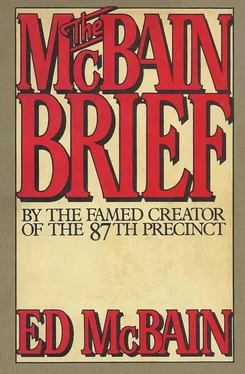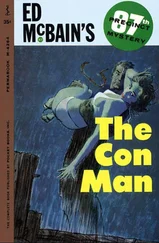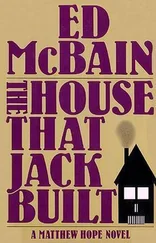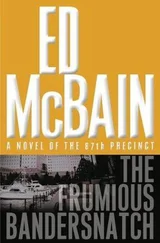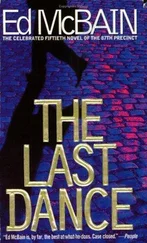Ed McBain - The Last Brief
Здесь есть возможность читать онлайн «Ed McBain - The Last Brief» весь текст электронной книги совершенно бесплатно (целиком полную версию без сокращений). В некоторых случаях можно слушать аудио, скачать через торрент в формате fb2 и присутствует краткое содержание. Город: New York, Год выпуска: 1982, ISBN: 1982, Издательство: Arbor House, Жанр: Криминальный детектив, на английском языке. Описание произведения, (предисловие) а так же отзывы посетителей доступны на портале библиотеки ЛибКат.
- Название:The Last Brief
- Автор:
- Издательство:Arbor House
- Жанр:
- Год:1982
- Город:New York
- ISBN:978-0877955306
- Рейтинг книги:3 / 5. Голосов: 1
-
Избранное:Добавить в избранное
- Отзывы:
-
Ваша оценка:
- 60
- 1
- 2
- 3
- 4
- 5
The Last Brief: краткое содержание, описание и аннотация
Предлагаем к чтению аннотацию, описание, краткое содержание или предисловие (зависит от того, что написал сам автор книги «The Last Brief»). Если вы не нашли необходимую информацию о книге — напишите в комментариях, мы постараемся отыскать её.
The Last Brief — читать онлайн бесплатно полную книгу (весь текст) целиком
Ниже представлен текст книги, разбитый по страницам. Система сохранения места последней прочитанной страницы, позволяет с удобством читать онлайн бесплатно книгу «The Last Brief», без необходимости каждый раз заново искать на чём Вы остановились. Поставьте закладку, и сможете в любой момент перейти на страницу, на которой закончили чтение.
Интервал:
Закладка:
‘My place,’ she said. An undisguised coldness had crept into her voice.
‘Don’t take this so big,’ he said. ‘It’s part of a working day.’
‘I didn’t know that,’ the girl said.
‘Well, now you do.’
They walked in silence. Around them, the concrete fingers of the city poked at the October sky. The fingers were black with the soot of decades, grimy fingers covered with waste and not with the honest dirt of labour. The streets crawled with humanity. Old men and young men, kids playing stickball, kids chalking up the sidewalks, women with shopping bags, the honest citizens of the precinct — and the others. In the ten minutes it took them to walk from the precinct to the girl’s apartment, Randolph saw fourteen junkies in the streets. Some of those junkies would be mugging before the day ended. Some would be shoplifting and committing burglaries. All would be blind by nightfall.
He saw the bright green and yellow silk jackets of a teenage gang known as ‘The Marauders,’ and he knew that the appearance of a blue and gold jacket in their territory would bring on a street bop and broken ribs and bloody heads.
He saw the hookers and the pimps and the sneak thieves and the muggers and the ex-cons and the kids holding J. D. cards and the drunks and the fences and the peddlers of hot goods — he saw them all, and they surrounded him with a feeling of filth, a feeling he wanted desperately to search out and crush because somewhere in the filth he had lost himself.
Somewhere, long ago, a young patrolman had cracked a liquor store holdup, and the patrolman had been promoted to Detective/Third Grade, and the patrolman’s name was Frank Randolph. And somewhere back there, the patrolman Frank Randolph had ceased to exist, and the detective Frank Randolph had inhabited the shell of his body. The eyes had turned hard, and the fists had turned quick, and the step had turned cautious because there was danger in these streets, and the danger awakened every animal instinct within a man, reduced him to a beast stalking blood in the narrow, dark passages of the jungle. There was hatred within the muscular body of Frank Randolph, a hatred bred of dealing with tigers, a hatred which included the timid antelopes who also lived in the forest. And so he walked with a young, thin girl, walked toward her apartment where he would use his shield as a wedge to enter her bed and her body. He had begun using his shield a long time ago. He was as much an addict to his shield as the junkies in the streets were addicts to the white god.
The tenement stood in a row of sombre-faced buildings, buildings that solemnly mourned the loss of their latter-day splendor. The fire escapes fronting each building were hung with the trappings of life: blankets, potted plants, pillows, empty beer cans, ash trays, guitars. Autumn had come late this year, lingering over the slow death of a hot summer, and the cliff dwellers had taken to their slum terraces, the iron-barred rectangles that gave them a piece of sky and a breath of air.
‘This is it,’ she said.
He followed her up the stoop. A woman was sitting on the steps, knitting. She glanced up at him as he passed, sensing immediately, with the instinct of self-preservation, that he was a cop. He could almost feel her shrinking away from him, and his own instinct asked the question, ‘What’s she done to be afraid of?’
Garbage cans were stacked in the hallway. The refuse had been collected earlier that day, but the cans were never washed and they filled the air with the stink of waste. There was a naked light bulb hanging in the entrance foyer, but it would not be turned on until dusk.
The girl climbed the steps ahead of him. He walked behind her; her legs were remarkably good for a girl so thin. They climbed steadily. There were voices behind the doors. He heard the voices in the medley of sound, and he reflected on the doors he had broken, a quick flatfooted kick against the lock to spring it, since he’d been a detective. Rarely had he knocked on a door. Rarely had he given the occupant a chance to unlatch it. The kick was quicker, and it precluded the possibility of a door being opened to reveal a hostile gun inside.
‘It’s on the third floor,’ the girl said.
‘All right,’ he answered, and he kept following her, watching her legs.
‘Be careful, there’s a broken bottle.’
He skirted the shards of brown glass, smelling the whiskey fumes as he passed the alcohol-soaked wood. The girl stopped at a door at the end of the hall. She unlocked it and waited for him to enter. When they were both inside, she put the police lock in place, leaning the heavy, unbending steel bar against the door, hooking it securely into the steel plate embedded in the floor, so that it formed a formidable triangle against which entrance was impossible.
The kitchen was small but clean. A round table sat in the centre of the room, and a bowl was on the table. A single apple rested in the bowl. The girl went to the window and lifted the shade. Light, but not sunlight, entered the room. It was a pale light that bounced from the brick walls of the tenement not four feet away, leaping the airshaft between the building. The girl turned.
‘I... I don’t know what to do,’ she said. ‘I’ve never done this before.’
‘No?’ he said, and there was a trace of sarcasm in his voice.
‘No. Could... could we talk a little?’
‘What about?’
‘I don’t know. Anything.’ The room grew silent. Patiently, Randolph waited.
‘I’m... I’m sorry the place isn’t nicer,’ the girl said.
‘It’ll do.’
‘I meant—’ She shrugged.
‘What?’
‘I don’t know. A girl likes to think—’ She stopped, shrugging again. ‘Would you like a beer or something? I think we have some cold in the Frigidaire.’
‘No, thanks,’ Randolph said. He grinned. ‘We’re not allowed to drink on duty.’
The girl missed his humour. She nodded and then sat opposite him at the table. Silence crowded the room again.
‘Have you been a cop long?’ the girl asked.
‘Eight years.’
‘It must be terrible. I mean, being a cop in this neighbourhood. ‘
For a moment, Randolph was surprised. He looked at the girl curiously and said, ‘What do you mean?’
‘All the... all the dirt here,’ she said.
‘It...’ He paused, studying her. ‘You get used to it.’
‘I’ll never get used to it,’ she said.
She seemed about to cry. For a panicky instant, he wanted to bolt from the room. He sat undecided at the table, and then he heard himself saying, ‘This isn’t so bad. This is a nice apartment.’
‘You don’t really mean that,’ she said.
‘No,’ he answered honestly. ‘I don’t.’
The girl seemed to want to tell him about the apartment. Words were perched on the edge of her tongue, torrents of words, it seemed, but when she spoke she only said, ‘I haven’t got my own room.’
‘That’s all right,’ he said. ‘We can use...’ And then he stopped his tongue because he sensed the girl had meant something entirely different, and the sudden insight surprised him and frightened him a little.
‘Where do you live?’ she asked.
‘In a hotel,’ he said.
‘That must be nice.’
He wanted to say, ‘No, it’s very lonely.’ Instead, he said, ‘Yeah, it’s all right.’
‘I’ve never been to a hotel. Do people wait on you?’
‘This is an apartment hotel. It’s a little different.’
‘Oh.’
She sat at the table, and he watched her, and suddenly she was trembling.
‘What’s the matter?’ he asked.
‘I’m scared,’ she said.
‘Why?’
‘Because of... of what I almost did. What I almost became.’
‘What do you mean?’
Читать дальшеИнтервал:
Закладка:
Похожие книги на «The Last Brief»
Представляем Вашему вниманию похожие книги на «The Last Brief» списком для выбора. Мы отобрали схожую по названию и смыслу литературу в надежде предоставить читателям больше вариантов отыскать новые, интересные, ещё непрочитанные произведения.
Обсуждение, отзывы о книге «The Last Brief» и просто собственные мнения читателей. Оставьте ваши комментарии, напишите, что Вы думаете о произведении, его смысле или главных героях. Укажите что конкретно понравилось, а что нет, и почему Вы так считаете.
